HOLA, Buenas tardes, Saludos apreciada comunidad HIVE, deseando se encuentren muy bien todos. Les cuento que en éste, mi segundo post voy a remontarme hacia hace poco más o menos de quinientos años, para referirme sinópticamente a los orígenes de la presencia de la llamada Cultura Negra en lo que hoy conocemos como Latinoamérica y el Caribe, antes Indias Occidentales; digo Cultura Negra ya que el calificativo responde a un término peyorativo el cual se le atribuyó a millones de personas quienes en condiciones de esclavizados, fueron sacados de sus contextos originales en ÁFRICA, y debido a la pigmentación de su piel y el valor agregado de condiciones corporales para soportar condiciones extremas, fueron llamados “NEGROS”. En momentos actuales ante las amenazas por desinterés, olvido y de los conceptos híbridos, es imperiosa la necesidad de valorar los aportes de éste significativo sector de la población tanto ayer como hoy.
HELLO, Greetings dear HIVE community, wishing you all well. I tell you that in this, my second post, I am going to go back a little more or less than five hundred years ago, to refer synoptically to the origins of the presence of the so-called Black Culture in what we know today as Latin America and the Caribbean, formerly the West Indies; I say Black Culture since the qualifier responds to a pejorative term which was attributed to millions of people who in conditions of enslaved, were taken from their original contexts in AFRICA, and due to the pigmentation of their skin and the added value of body conditions to withstand extreme conditions, were called "NEGROS". At present, faced with the threats of disinterest, oblivion and hybrid concepts, it is imperative to value the contributions of this significant sector of the population both yesterday and today.
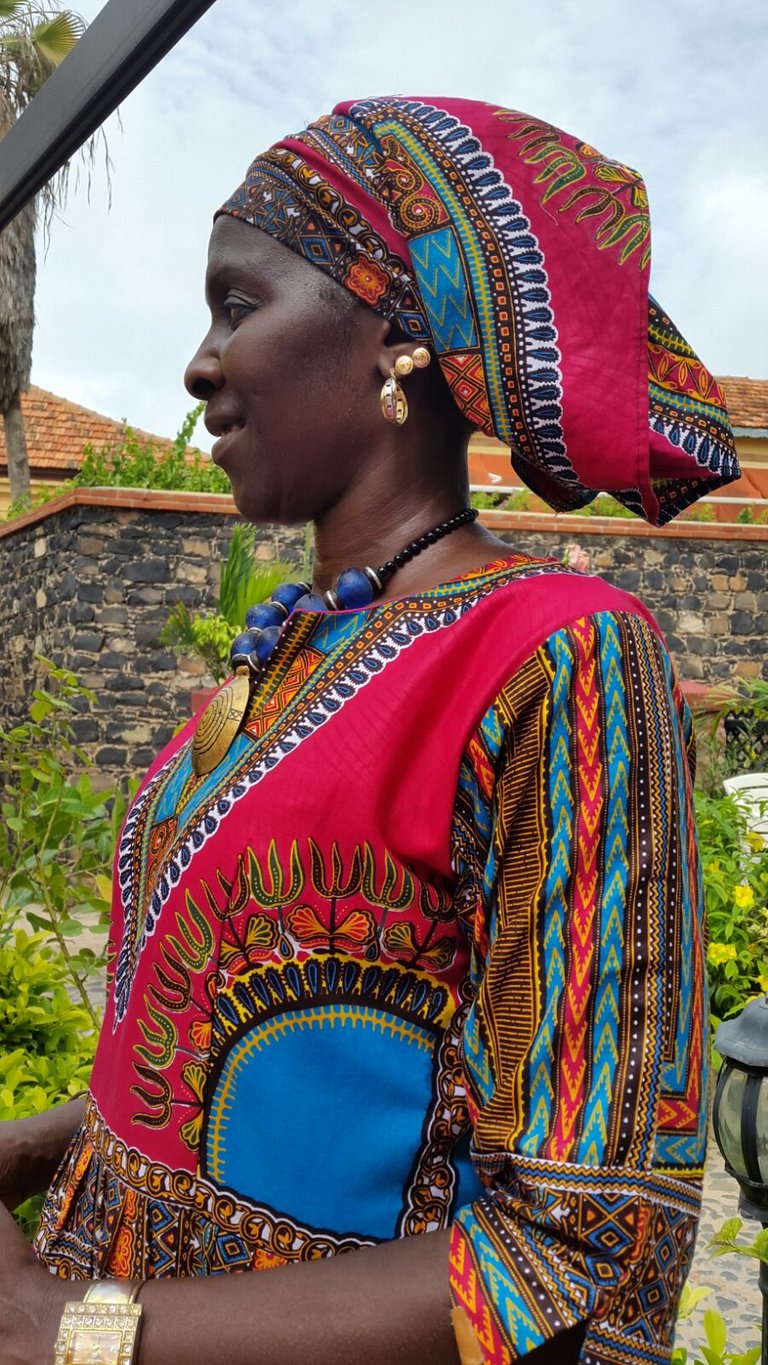
Foto tomada por mi hermano en la isla de Goré
Sectores dedicados al estudio de este tema, preferimos identificar tal como fueron y merecen las personas provenientes de ese continentes: Africanos secuestrados sumidos a la condición de esclavizados. En éste sentido como reivindicación a su acontecer histórico se utiliza el gentilicio: africanos, y el rol al cual fueron destinados: esclavizados. NO esclavos ya que no nacieron como tales, ni eran tales, sino que fueron sometidos violentamente a serlo.
- Sectors dedicated to the study of this subject, we prefer to identify as they were and deserve the people coming from that continent: Africans kidnapped and submerged to the condition of enslaved people. In this sense, as a vindication of their historical event, we use the gentilicio: Africans, and the role to which they were destined: enslaved. NOT slaves, since they were not born as such, nor were they slaves, but were violently subjected to be so.
Sus descendientes reconocidos, asumimos el apelativo afrodescendiente en honor y respeto a los millones de personas sometidas a ésta barbarie y dentro de la cual por razones obvias, se encuentran nuestras raíces, nuestros ancestros, que debido a la escases o falta de registros escritos alusivos, sólo conocemos como memoria general, no familiar menos individual. Tampoco aceptamos el apelativo de “NEGROS” ya que éste infiere una de las tantas maneras de deshumanización a la que fuimos sometidos, relegándonos al nivel de un color, una cosa, un instrumento. Aún, lamentablemente existen espacios donde el término negro aludiendo a una persona, no ha sido desarraigado, con las implicaciones subyacentes.
- We, their recognized descendants, assume the appellative Afro-descendant in honor and respect to the millions of people subjected to this barbarism and within which, for obvious reasons, are our roots, our ancestors, that due to the scarcity or lack of allusive written records, we only know as a general memory, not familiar, less individual. Nor do we accept the appellation of "NEGROS" since it infers one of the many ways of dehumanization to which we were subjected, relegating us to the level of a color, a thing, an instrument. Unfortunately, there are still spaces where the term black alluding to a person, has not been uprooted, with the underlying implications.

Foto descargada de prexel
En una oportunidad resumí esta realidad en lo que llame ecuación social asociativa: hablar de trabajos forzados es hablar de negros, y referirse a éstos es hablar de esclavizados y referirse a esclavizados, negros, trabajos forzados en todos contextos es sinónimo de masas populares. No, negro es un color, Afrodescendiente es ser y poseer una actitud valorativa y reivindicativa de nuestros orígenes. Aceptamos el calificativo negro cuando nos referimos a acciones de “honor y honra a nuestra procedencia”, como la consigna de los mensajes de Mather Luther KING : “ QUE VIVAN LOS NEGROS”, repito no por su contenido peyorativo, sino por el orgullo que sentimos por todas las condiciones que ellos vivieron y vivimos. Los ancestros africanos y nosotros sus descendientes, tuvimos y tenemos los mismos derechos por leyes biológicas y sociales universales que en distintos espacios no son del todo reconocidos Los afrodescendientes por ejemplo, no podemos elaborar como otros grupos, nuestro árbol genealógico que trascienda más allá de la primera o segunda línea de ascendencia ya que no hay registros de tales, apenas pudo existir la oralidad que está corriendo el riesgo implacable del el olvido por la extinción en la memoria de generaciones que han ido falleciendo.
- On one occasion I summarized this reality in what I call an associative social equation: to speak of forced labor is to speak of blacks, and to refer to blacks is to speak of the enslaved, and to refer to the enslaved, blacks, forced labor in all contexts is synonymous with the popular masses. No, black is a color, Afrodescendant is to be and to possess a valuing and vindicating attitude of our origins. We accept the qualifier black when we refer to actions of "honor and honor to our origin", as the slogan of the messages of Mather Luther KING: "LONG LIVE THE BLACKS", I repeat not for its pejorative content, but for the pride that we feel for all the conditions that they lived and we live. The African ancestors and we their descendants, had and have the same rights by universal biological and social laws that in different spaces are not fully recognized. The Afro-descendants for example, we cannot elaborate as other groups, our family tree that transcends beyond the first or second line of ancestry since there are no records of such, there could only be the oral tradition that is running the relentless risk of oblivion by extinction in the memory of generations that have been dying.
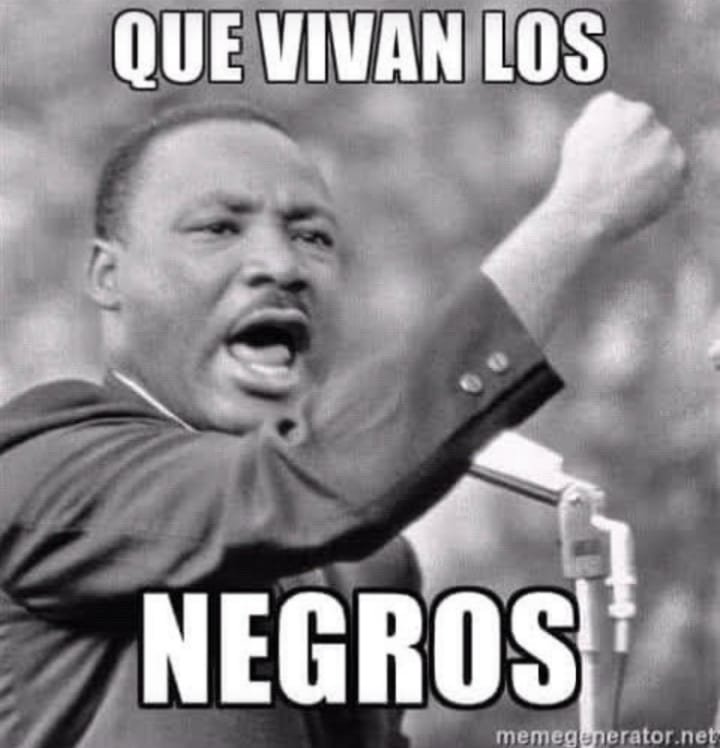
Imagen tomada de memegenrator.net
Obtener toda la información que se posee en la actualidad, ha sido resultado de un acucioso y detallado proceso de recolección y rígida compilación. “Las Venas de Latinoamérica”, el término con el cual metafóricamente vínculo con todos los caminos, trechos recorridos terrestres o fluviales por los cuales debieron transitar los africanos esclavizados llegados al continente, comenzaron a activarse con el Comercio Triangular, espacio mercantilista cuyo objeto protagónico y fundamental, era el africano, literalmente cazado en África, cuando para ellos solo era el inicio del martirio. Una vez bajo las manos del esclavista, ninguno regresaría a sus espacios originales y al ser esclavizados bajo severos controles, castigos y tratos, se les somete a un fuerte proceso de deshumanización y despersonalización. Se les cambiaron sus nombres, eran separadas familias, comunidades enteras, perdiendo su libertad y ubicados en casas de esclavizados; allí se inicia el primer paso del Comercio Triangular, identificado como Trata Negrera, venta o subastas de los africanos para ser llevados como herramientas de trabajo a América y a todas las Islas del Caribe.
- Obtaining all the information currently available has been the result of a painstaking and detailed process of collection and rigid compilation. The "Veins of Latin America", the term with which I metaphorically link all the roads, stretches of land or river routes through which the enslaved Africans who arrived in the continent had to travel, began to be activated with the Triangular Trade, a mercantilist space whose main and fundamental object was the African, literally hunted in Africa, when for them it was only the beginning of the martyrdom. Once under the slaver's hands, none of them would return to their original spaces and being enslaved under severe controls, punishments and treatments, they were subjected to a strong process of dehumanization and depersonalization. Their names were changed, families and entire communities were separated, they lost their freedom and were placed in slave houses; there began the first step of the Triangular Trade, identified as the Negrera Trade, sale or auction of Africans to be taken as work tools to America and all the Caribbean Islands.
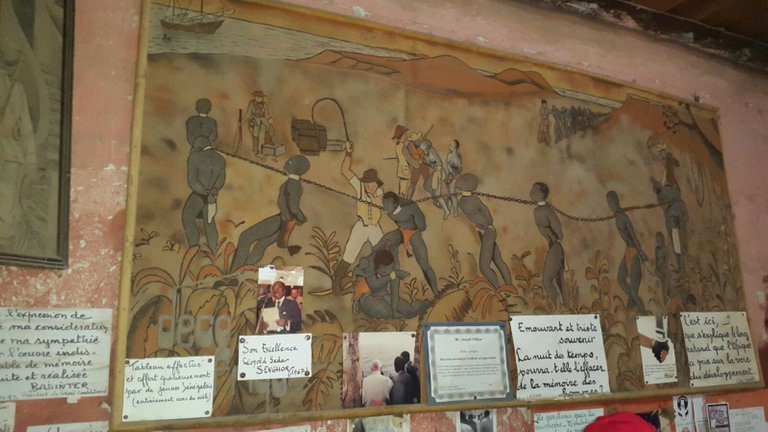
Crónica sobre comercio de esclavizados realizada por jóvenes senegaleses. Nótense fotos y mensajes de visitantes a la Casa-Museo como Sedar Zenghor y un Papa - Goré 2015 Foto tomada por mi hermano Anibal Márquez en Goré.
De las casas de esclavos salían con frecuencia cientos de barcos negreros conteniendo sumas elevadas de africanos atados de pies y manos de tal forma que ocuparan el menor espacio posible para aumentar la cantidad a ser trasladados, de ésta manera aseguraban sus ganancias, atravesaban el Atlántico para llegar a los puertos de las Indias Occidentales, donde habían sido previamente requeridos por los colonizadores; segunda fase del Comercio Triangular. En el territorio que hoy corresponde a nuestro país, los puertos negreros más importantes se encontraban en La Guaira, Coro, Cumaná.
- Hundreds of slave ships frequently departed from the slave houses containing large amounts of Africans tied hand and foot in such a way that they would occupy as little space as possible in order to increase the amount to be transported, thus ensuring their profits, crossing the Atlantic to reach the ports of the West Indies, where they had been previously required by the colonizers; the second phase of the Triangular Trade. In the territory that today corresponds to our country, the most important slave ports were located in La Guaira, Coro and Cumaná.
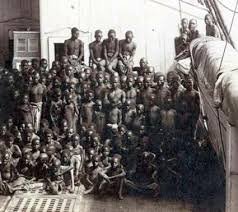
Foto de www.nocierreslosojos.com
Ya en América, por sus venas, eran trasladados a pie, hasta los distintos rincones de sus respectivos destinos, donde fueron ocupados para realizar las más arduas tareas de trabajo de campo en condiciones rigurosas y extenuantes. Haciendas, plantaciones, minas, mar, ríos eran los lugares donde estas personas transcurrían prácticamente todo el día, bajo el control y yugo del cepo y el látigo.
- Once in America, through their veins, they were transported on foot to the different corners of their respective destinations, where they were employed to carry out the most arduous tasks of field work in rigorous and exhausting conditions. Farms, plantations, mines, sea, rivers were the places where these people spent practically the whole day under the control and yoke of the stocks and the whip.
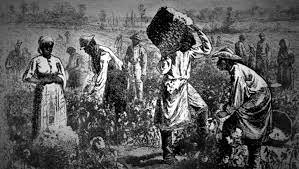
Foto de www.agenciasin.es
Lo obtenido de la producción de todas estas unidades eran vendidas y manejadas monopólicamente por las Casas Mercantiles, en el caso de nuestro país, estaba La Compañía Guipuzcoana, mediante la cual compraban a los productores a bajos costos y enviaban estos a España desde donde eran distribuidos a mayores precios en el mercado europeo, tercera fase del Comercio Triangular.
- The proceeds from the production of all these units were sold and managed monopolistically by the Mercantile Houses, in the case of our country, there was La Compañía Guipuzcoana, which bought from the producers at low costs and sent them to Spain from where they were distributed at higher prices in the European market, the third phase of the Triangular Trade.
Relatada la dinámica triangular de distribución y uso de los africanos esclavizados en Latinoamérica, podemos comprender como ellos llegaron los lugares más recónditos, haciendo uso de caminos, trochas, vías de acceso, legales y clandestinos, abiertos para el tránsito del preciado instrumento de trabajo. Siendo recorridos por un innumerable contingente de personas, (no consideradas como tales), quienes a pesar de haber perdido su Libertad, no sólo llevaban con ellas el latido fluido e incesante por recuperarla, sino también todo un contenido cultural, expresiones religiosas, musicales, artesanías, gastronomía, medicinales que los identificaban y constituían su acervo. No obstante de haber sido aculturados, ya que se les prohibió toda práctica de los mismos, siempre los llevaban en su memoria, en su conciencia, de allí nadie podía arrebatárselas y en momentos y espacios posibles a espaldas del amo aprovechaban para ponerlas en práctica.
- Having recounted the triangular dynamics of distribution and use of enslaved Africans in Latin America, we can understand how they reached the most remote places, making use of roads, trails, access routes, legal and clandestine, open for the transit of the precious instrument of labor. Being traveled by an innumerable contingent of people, (not considered as such), who in spite of having lost their Freedom, not only carried with them the fluid and incessant beat to recover it, but also a whole cultural content, religious, musical, handicrafts, gastronomy, medicinal expressions that identified them and constituted their heritage. In spite of having been acculturated, since they were forbidden to practice them, they always carried them in their memory, in their conscience, no one could take them away from them and at possible moments and spaces behind the master's back they took advantage of them to put them into practice.
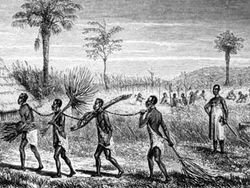
Foto de muyhistoria.es
Ciertamente, esto representa la Ancestralidad Africana: un pasado remoto construido por el aporte físico y cultural de millones de personas esclavizadas, quienes aportando su arduo trabajo y por medio de la práctica clandestina de sus contenidos culturales, generaron un acervo de vida peculiar, caracterizado por retomar sus condiciones de vida naturales, el cual fue transmitido de generación en generación, la mayoría de las veces por la vía de la oralidad, con una serie de códigos que los definían y diferenciaban.
Certainly, this represents the African Ancestry: a remote past built by the physical and cultural contribution of millions of enslaved people, who by contributing their hard work and through the clandestine practice of their cultural contents, generated a peculiar way of life, characterized by taking up their natural living conditions, which was transmitted from generation to generation, most of the time through orality, with a series of codes that defined and differentiated them.
De tal manera que los africanos esclavizados no solo aportaron en América su fuerza de trabajo; por todos los caminos recorridos como intrincadas venas, llevaban en el fluir de su sangre, la esencia, el palpitar de su Cultura, para unos inexistente, para otros oculta, que los mantuvo ante la adversidad siempre fuertes, erguidos, dignos tanto como en el corazón de su África Subsahariana.
“No había que registrar la historia y cultura del negro, simplemente porque el negro no tenía Cultura”
(Ascencio, 1984.103) La Desvalorización del Hombre Negro y su Cultura.
- In such a way that the enslaved Africans not only brought to America their labor force; through all the roads they traveled like intricate veins, they carried in the flow of their blood, the essence, the palpitation of their Culture, for some nonexistent, for others hidden, that kept them in the face of adversity always strong, erect, dignified as much as in the heart of their Sub-Saharan Africa.
"There was no need to record the history and culture of the Negro, simply because the Negro had no Culture."
(Ascencio, 1984.103) The Devaluation of the Black Man and his Culture.
Todo ese bagaje de saberes culturales ancestrales, se dispersó, así como se dispersó el africano esclavizado, siendo transmitidos por la vía oral y practica de generación en generación, ya que registros escritos puntuales no existen o son escasos. Esa dispersión es la denominada Diáspora Africana, que en inicios de la colonia implicaba a los africanos esclavizados de manera forzada en América, pero que hoy por hoy la identificamos como todos los Afrodescendientes reconocidos en el Mundo.
- All this baggage of ancestral cultural knowledge was dispersed, just as the enslaved African was dispersed, being transmitted orally and in practice from generation to generation, since specific written records do not exist or are scarce. This dispersion is the so-called African Diaspora, which at the beginning of the colony involved Africans forcibly enslaved in America, but which today we identify as all Afro-descendants recognized in the world.
Es de fundamental importancia visibilizar los aportes que los africanos esclavizados realizaron en la conformación del abanico cultural y los matices étnicos que, hoy por hoy, dibujan a las sociedades Latinoamericanas y Caribeñas, definiéndolas como pluriculturales y multiétnicas, es decir, no hay una sola e igual cultura, existe una diversidad cultural, que bajo los principios de la Tolerancia y Respeto Étnico deben coexistir, interactuar para eliminar o disminuir los prejuicios sociales productos de historias y consideraciones sesgadas. Formar o reformular nuestra identidad y sentido de pertenencia étnica es vital para que dichos aportes sigan intachables al tiempo que aumenten en esencia para no relegarlas al olvido y su pérdida en el tiempo.
- It is of fundamental importance to make visible the contributions that the enslaved Africans made in the conformation of the cultural range and ethnic nuances that, today, draw the Latin American and Caribbean societies, defining them as pluricultural and multiethnic, that is to say, there is not a single and equal culture, there is a cultural diversity, that under the principles of Tolerance and Ethnic Respect must coexist, interact to eliminate or diminish the social prejudices products of histories and biased considerations. Forming or reformulating our identity and sense of ethnic belonging is vital for these contributions to remain unblemished while increasing in essence so as not to relegate them to oblivion and their loss over time.
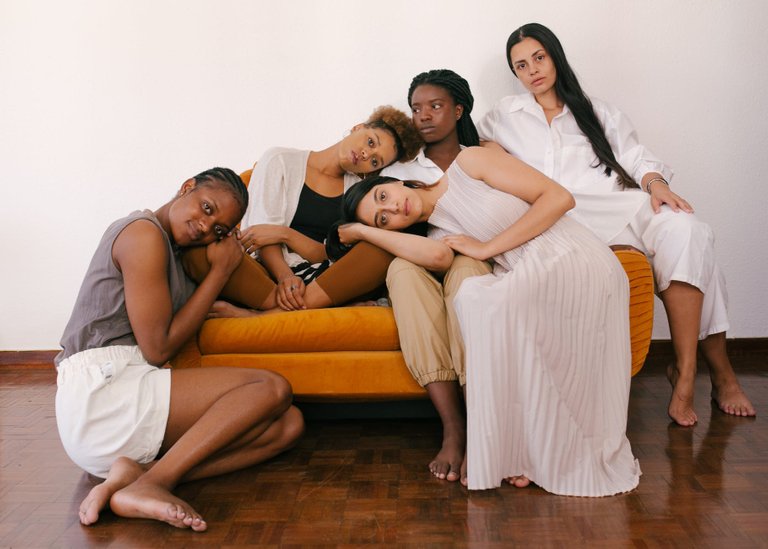
Foto de Pexels RF._.studio
Hoy, las voces y gritos de nuestros ancestros retumban en toda la extensión Latinoaméricana y Caribeña a través de sus tambores, bailes, comidas, artesanía, ritos en los afrodescendientes, en sus asentamientos y en los espacios diversos, con todas sus variaciones de formas mas no de fondo, porque todas parten de un tronco común: MAMÁ ÁFRICA.
- Today, the voices and cries of our ancestors resound throughout Latin America and the Caribbean through their drums, dances, food, crafts, rites in the Afro-descendants, in their settlements and in diverse spaces, with all their variations in form but not in substance, because they all stem from a common trunk: MAMÁ AFRICA.
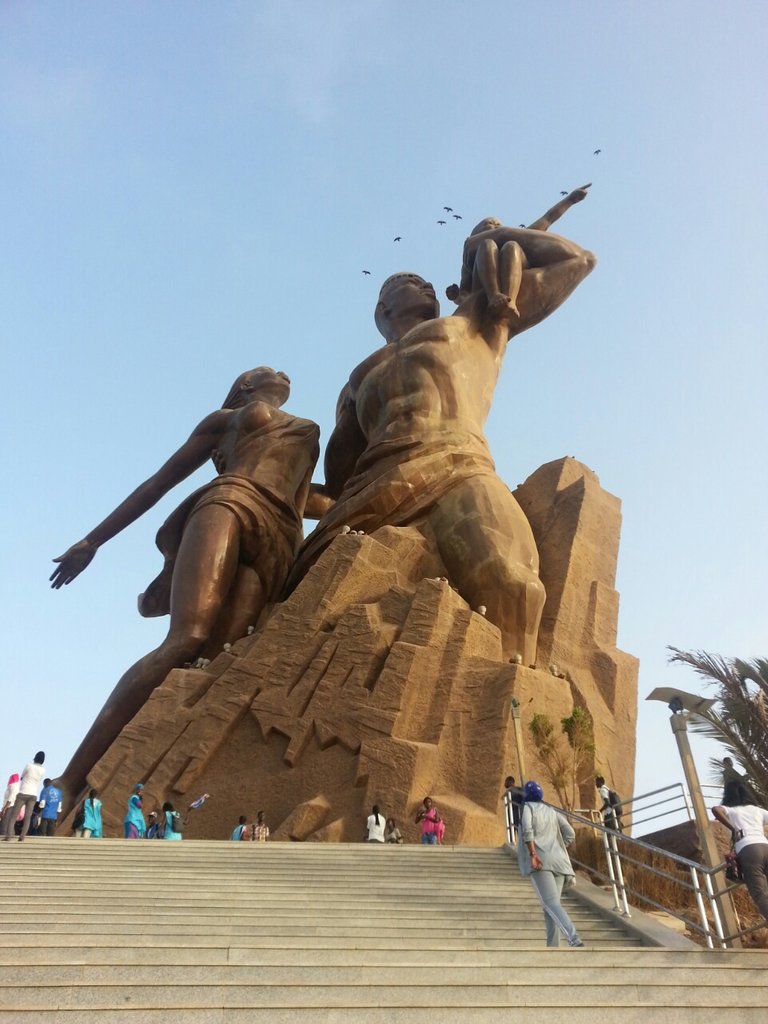
Monumento en homenaje a la Libertad, Museo de Goré, Foto tomada por mi hermano Anibal Márquez.
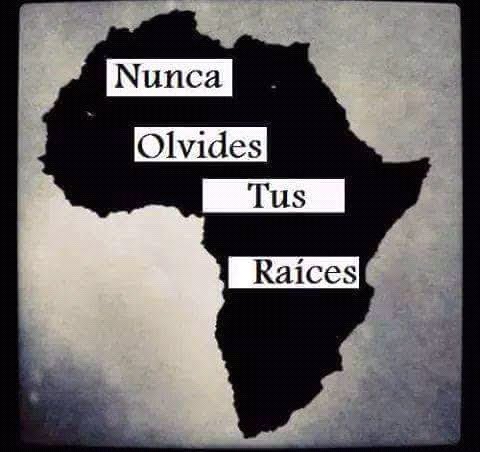
Foto de posterredbubble.com
Your post has been curated by us! Received 20.00% upvote from @opb. Do consider delegate to us to help support our project.
Do join our discord channel to give us feedback, https://discord.gg/bwb2ENt
* This bot is upvoting based on the criteria : 1. Not plagiarised, 2. Persistent previous quality posts, 3. Active engagement with other usersDo upvote this commment if you 💚 our service :)
Congratulations @mmarquez! You have completed the following achievement on the Hive blockchain and have been rewarded with new badge(s) :
Your next payout target is 50 HP.
The unit is Hive Power equivalent because your rewards can be split into HP and HBD
You can view your badges on your board and compare yourself to others in the Ranking
If you no longer want to receive notifications, reply to this comment with the word
STOPCongratulations @mmarquez! You have completed the following achievement on the Hive blockchain and have been rewarded with new badge(s) :
Your next target is to reach 300 upvotes.
You can view your badges on your board and compare yourself to others in the Ranking
If you no longer want to receive notifications, reply to this comment with the word
STOPBuenas noches, saludos, gracias, si deseo continuar recibiendo sus notificaciones, gracias
De nada @mmarquez 😊🌹
Apóyenos también y vote por nuestro testigo.
Recibirá una insignia adicional y un voto más fuerte de nuestra parte cuando le notifiquemos.